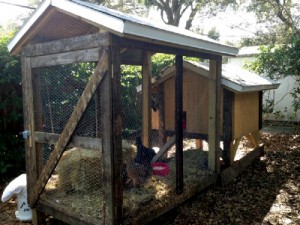Urban Chickens Hatch a Healthy Concept
Orlando resident and egg lover Keri Leymaster can enjoy a fresh, homemade omelet any day of the week thanks to Fred Couples, Rory McIlroy, and Phil Mickelson. The famous PGA pros are not moonlighting as personal chefs but, rather, are the names of Leymaster’s three chickens. Raised on a farm, Leymaster, who typically opts for organic meals, soared at the chance to participate in the City of Orlando’s Urban Chicken Pilot Program. “It’s a lot of fun and allows me to know where my food is coming from,” explained Leymaster, Assistant Director of Harry P. Leu Gardens.
In May 2012, Orlando approved a two-year pilot program with the option to extend, joining the growing list of major cities like Chicago, Los Angeles, and New York. “The City of Orlando’s Urban Chicken Program allows for up to 75 households to obtain permits and, thus far, 39 have followed through with the process, including Commissioner Patty Sheehan,” said Jason Burton, Orlando’s Chief Planner. To participate, residents must follow an outlined pecking order: develop a coop plan, take an instructional class, and obtain no more than 3 chickens (roosters are not permitted). The guidelines specify that coop structures must be 5 feet from the residential property line, housed in the rear yard, and 20 feet away from neighboring structures.
 Leymaster chose to buy a coop kit online, purchased two chicken breeds from a St. Cloud farm, and fulfilled the course requirement through the Orange County IFAS Extension. “Our two-hour course teaches potential owners how to properly care for chickens, including handling, feeding, keeping safe from predators, and how to keep the chickens laying,” explained Dennis Mudge, Agriculture & Animal Science Coordinator at the University of Florida/IFAS Extension. The Urban Chicken Program is not about saving money on groceries, explains program participant Karen MacDonald, but rather a lifestyle choice. “For some reason, I always wanted chickens,” MacDonald quipped, whose three chickens, Ceasar, Spartacus, and Maximus, lay about a dozen light green or teal-colored eggs per week and, like Leymaster, says, “I know what they’ve been fed and, in turn, what is going into my own food.” Aside from chicken feed, the backyard fowls consume vegetable or fruit scraps. “Because they can eat some of our leftover meal scraps, we produce less food waste and so we are reducing our carbon footprint, in addition to eliminating the plastic and Styrofoam packing (that store bought eggs typically come in),” says Leymaster.
Leymaster chose to buy a coop kit online, purchased two chicken breeds from a St. Cloud farm, and fulfilled the course requirement through the Orange County IFAS Extension. “Our two-hour course teaches potential owners how to properly care for chickens, including handling, feeding, keeping safe from predators, and how to keep the chickens laying,” explained Dennis Mudge, Agriculture & Animal Science Coordinator at the University of Florida/IFAS Extension. The Urban Chicken Program is not about saving money on groceries, explains program participant Karen MacDonald, but rather a lifestyle choice. “For some reason, I always wanted chickens,” MacDonald quipped, whose three chickens, Ceasar, Spartacus, and Maximus, lay about a dozen light green or teal-colored eggs per week and, like Leymaster, says, “I know what they’ve been fed and, in turn, what is going into my own food.” Aside from chicken feed, the backyard fowls consume vegetable or fruit scraps. “Because they can eat some of our leftover meal scraps, we produce less food waste and so we are reducing our carbon footprint, in addition to eliminating the plastic and Styrofoam packing (that store bought eggs typically come in),” says Leymaster.
Leymaster and MacDonald agree that owning chickens is similar to owning any other type of domestic pet. “It’s definitely a commitment. Our neighbors ‘chicken sit’ when we’re away, and kids especially love it,” says MacDonald. Leymaster adds, “My two dogs love to pal around with ‘their girls.’” According to Mudge, the Urban Chicken Program allows residents to positively impact the environment with the added benefit of healthier nourishment. “Owners will know what they’ve fed their chickens. Think about the freshness ─ the egg is laid and immediately consumed; eliminating any transport delay from distant farms, to warehouses, to stores and, finally, to one’s kitchen table. Plus, the whole experience is an excellent, natural learning opportunity for families with children,” Mudge explained. To apply for the Urban Chicken Program, email Jason.Burton@cityoforlando.net.







